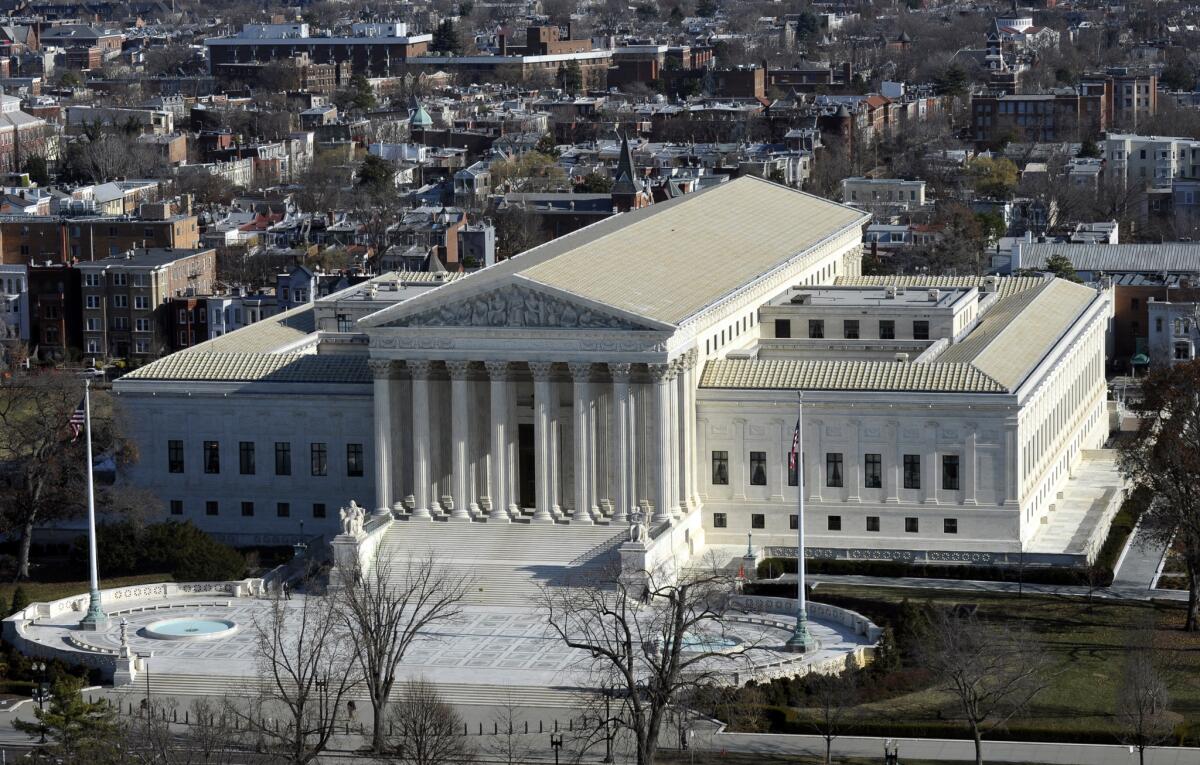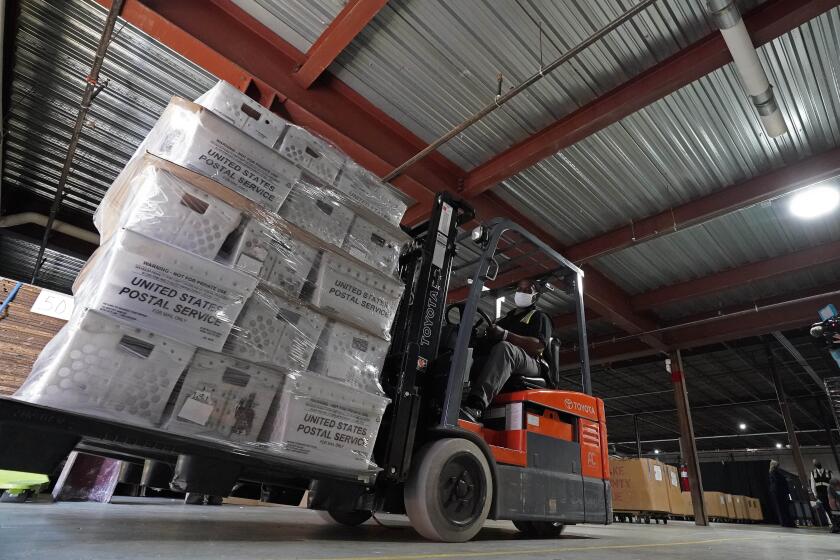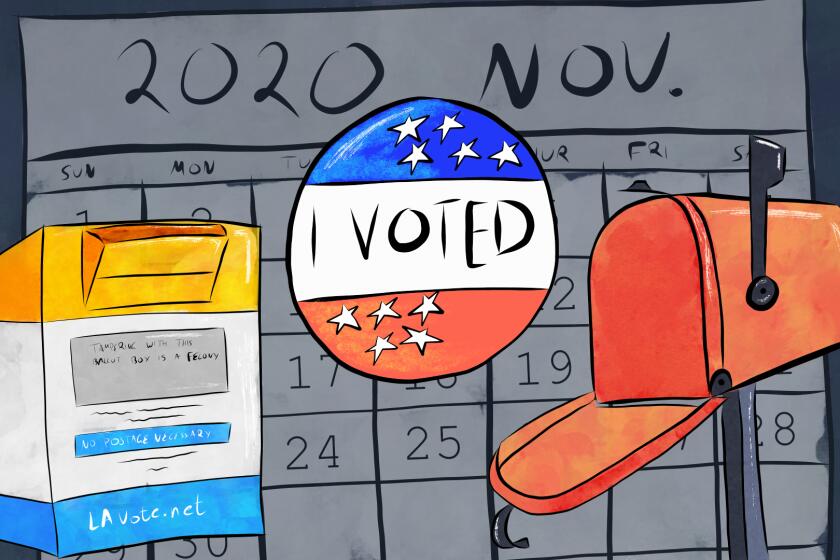Supreme Court denies Democrats’ appeal over Wisconsin’s deadline for mail ballots

WASHINGTON — The Supreme Court on Monday refused to extend the election-day deadline for mail ballots in Wisconsin, rejecting appeals from Democrats who said the Postal Service may not be able handle the flood of election mail by Nov. 3.
The justices by a 5-3 vote left in place a ruling by the 7th Circuit Court in Chicago that blocked relaxing the deadline in response to the pandemic.
The court’s five Republicans appointees were in the majority, while the three Democratic appointees — Justices Stephen Breyer, Sonia Sotomayor and Elena Kagan — said they would have granted the appeal.
The court’s decision was announced as the Senate prepared to vote to confirm Judge Amy Coney Barrett to fill the seat of the late Justice Ruth Bader Ginsburg.
Wisconsin election officials predict that as many as 2 million of its voters may cast their ballots by mail, and the court decisions require those ballots to arrive at a county election office by Nov. 3 if they are to be counted.
Democrats and voting rights advocates had argued that mail ballots that arrived up to six days after Nov. 3 should be counted if they were postmarked by election day. They won a ruling from a federal district judge in Madison, but lost by a 2-1 vote in the 7th Circuit.
The outcome stands in contrast to the court’s ruling in a similar dispute from Pennsylvania. On a tie vote, the justices let stand a ruling from Pennsylvania’s high court that extended the deadline for three days for ballots that were mailed by election day.
These states will probably decide if Joe Biden or President Trump wins the election. And their absentee ballot laws could determine when we find out.
However, in the Wisconsin case, the justices were being asked to overturn a lower court ruling that rejected a change in the state’s deadline. And to prevail, the Democrats needed the votes of at least five justices.
In a concurring opinion, Justices Neil M. Gorsuch and Brett M. Kavanaugh said the federal judges should not have intervened in the first place.
“The Constitution provides that state legislatures — not federal judges, not state judges, not state governors, not other state officials — bear primary responsibility for setting election rules,” Gorsuch wrote in Democratic National Committee vs. Wisconsin State Legislature.
Kagan wrote in dissent and argued the court should have upheld the federal judge’s order extending the deadline for counting late ballots. “As the COVID pandemic rages, the court has failed to adequately protect the nation’s voters. Tens of thousands of Wisconsinites, through no fault of their own, may receive their mail ballots too late to return them by election day,” she said.
Earlier, Judge Frank Easterbrook, a Reagan appointee on the 7th Circuit, had cited the so-called “Purcell principle” whereby the Supreme Court has frowned upon federal judges ordering changes in a state’s voting rules on the eve of an election.
But lawyers for the Democrats pointed to the Supreme Court’s ruling in April that allowed for counting late-arriving ballots in Wisconsin. Then, the court in an opinion siding with the Wisconsin Republicans, said ballots that were “postmarked by election day” would be counted in the primary, even if they arrived up to six days late.
In their appeal, the Democrats had asked the court to adopt the same rule now for the general election. They had the support of Wisconsin Gov. Tony Evers, a Democrat.
“The pandemic has created a dangerous choice for Wisconsin’s voters: risk exposure to the virus and the possibility of infection, illness, and death, or minimize that risk by voting absentee,” he told the justices in a friend-of-the-court brief. “Because of the continuing severe upsurge in COVID-19 cases in Wisconsin, ... it is likely that an increasing number of Wisconsin’s voters will choose in the remaining weeks before the election to protect themselves and vote absentee.”
The state legislature, controlled by Republicans, appealed to the 7th Circuit and won a ruling to bar the counting of late-arriving mail ballots.
Wisconsin’s lawmakers had urged the high court to stand aside. “The legislature’s decision not to change Wisconsin’s exceedingly generous election laws for the November 2020 election falls squarely within its broad authority ... and is thus not subject to second-guessing by an unelected federal judiciary,” they said.
In their appeal, Democrats pointed to a strong dissent from 7th Circuit Judge Ilana Rovner, an appointee of President George H.W. Bush. “This is a travesty,” she wrote. “the inevitable result of the court’s decision today will be that many thousands of Wisconsin citizens will lose their right to vote despite doing everything they reasonably can to exercise it.”
More to Read
Get the L.A. Times Politics newsletter
Deeply reported insights into legislation, politics and policy from Sacramento, Washington and beyond. In your inbox three times per week.
You may occasionally receive promotional content from the Los Angeles Times.













